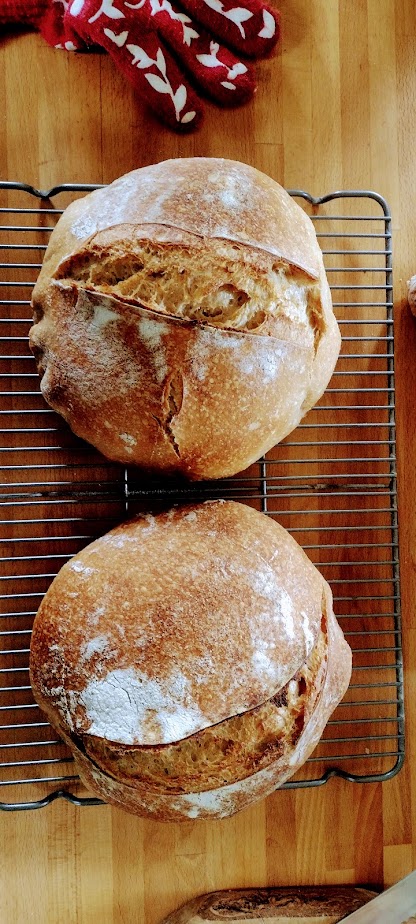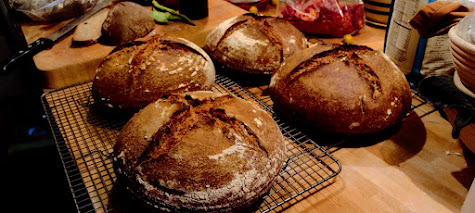Beekeeping Diversion: Making Bread
To to get my mind off losing bees this past winter and in years before, and from having to think about whether or not to continue another year (my 28th keeping bees), plus lots of stuff I'd rather not think about, I started to learn to cook last October, and as an offshoot, learned to bake bread. Which is, apparently, a "Pan"-demic thing, everyone is doing it.
Oh well, I love it. The craze for no-knead breads, the use of the Dutch Oven, and the profusion of internet info from a thousand 22 year old bakers discovering it all, has exploded. It wasn't there before, and now it is. The information was there, of course, but latent.
My wife is a retired executive chef, and before that, the long time owner of this valley's most famous hippie cool restaurant, but this era of bread is new to her- and though she has excellent advice, and is a serious kneader, this sort of bread making is alien. So I discover it on my own, mostly through a 2 foot stack of books, half lent to me, and of course, also via a few websites, hosting intense 25 year old urban farm mothers with 6 hungry kids and chickens (of course!), who are expert breadmakers after a few years, and a host of their male counterparts, hipster crazed young men half shaved or bearded, talking fast, faces right on the lens, trying to turn bread making videos into how they pay rent. Such a weird world.
There are a hundred cookbooks in my house , but for bread making, just a few. The go-to has always been Tassajara Breads, which I recall from being a young hippie student, and Laurel's Kitchen Breadbook. Both of similar eras, both pre-artisan breads, and both excellent. Seems to me those sort of started things up for what we have now.
Also, on the shelf here is a signed copy of the Macrina Bakery Cookbook, a famous Seattle bakery, and a book my wife received as a gift. And excellent- a predecessor to many more recent pre-ferment books. She refers to the importance of Carol Field's The Italian Baker in her understanding of bread, which I purchased in its brand new revised edition, and love. All the new books have amazing photos- which is a big change (and also why they cost $35).
Also, though well worn and never previously looked at by me, is Julia Child's Volume 2 of French Cooking, which has an amazing and detailed bread making section, which it turns out (per Reinhardt I think) was a major breakthrough for artisan bread makers, as she had direct access to Cavel, the man who saved French Bread from extinction and recorded how it was made and how to continue to make it. It's a great read. And- I find the line drawings FAR more informational than the pretty photos in more modern books.
And then there is the host of books lent to me. First a pair from the owner of La Medusa in Seattle, who is starting a Sicilian inspired bar next to her restaurant, who lent me two of Peter Reinhardt's books (Artisan Breads Every Day, and Crust and Crumb), and then from our friend, a local pro baker who worked (I think) for my wife as a baker in the 80s, Nancy Silverton's Breads from the La Brea Bakery, a 1990s book, but awesome with information; and finally from my cousin and friend, just out of the hospital recouping from a heart attack but a real "food" person, Jamie Morton's Brilliant Breads.
Jamie Morton is pretty much the best of them all- as a personality at least. Really telling it like it is: easy, doable, worth it, and transforming.
As a summary to all those books, plus incorporating the Dutch Oven craze (not sure when that came to be, Laurel talks about cooking in lidded cookware, but otherwise, its mostly bread stones), I purchased Flour, Water, Salt, Yeast by Ken Forkish. Excellent.
As they all are. All excellent. Though all, I am pretty sure, saying the same thing, or a variation. Which like all great skills, is easy to watch, but difficult to get right consistently.
I'd be negligent to not mention that I also learned- and am learning- so much from Youtube, all those intense "like-me" people, super smart, but intensely trying to make their quick mark.Though I'm too old to let go of books, but I benefit from both, and watching a few home bakers work has been worth a lot of words.
In any case, I've got miles to go to learn this, but I try to bake everyday. Though oddly, I eat none of it, instead I have 7 neighbors I deliver to , and (to date) seem to appreciate it. I get emails reviews back, I'm getting high marks! But I also make a heck of a lot of mistake which I don't share. It is certainly not something one masters by doing it once or twice! Just like beekeeping!



Comments
Post a Comment